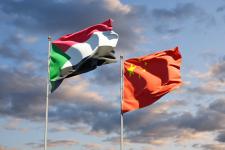What’s at stake for China in Sudan?

Sudan is facing renewed political instability and violence. DIIS senior researcher Luke Patey was asked by The China Africa Project for his assessment of the current situation and what is at stake for China. The full interview with Managing Editor Eric Olander is below.
ERIC OLANDER: Sudan was once a very important oil supplier to China but less so today. What’s at stake for the Chinese in Sudan in the wake of the coup?
LUKE PATEY: Sudan’s star does not shine as brightly for China as it once did. The North African country is no more a significant oil supplier to the Chinese market. A little under a decade ago, Sudan was China’s 6th largest foreign oil source, supplying 5.5% of its needs. That position fell sharply when South Sudan seceded and took 80% of the once united country’s oil resources with it. Civil war and political instability in South Sudan have diminished its role too and the Sudans hardly factor into China’s oil imports as they did in the past. This is due to stagnating oil production in both countries as well as China’s steadily growing oil demand (set to flatten by the decade’s end) and its impressive diversification efforts in finding oil partners close to home in Central Asia and far afield in Latin America. China’s new, somewhat muted approach is clearly indicated by the fall in its finance to Sudan post-2011, the year South Sudan spilt. From 2011 to 2018, China granted Sudan an estimated $143 million in loans. This pales to the near $6 billion, largely for power and transport projects provided between 2003 and 2010.
That said, China is still an important economic partner for Sudan. It is still one of Sudan’s main trading partners and an active investor across multiple sectors, including in mining. For Beijing, there are plenty of Chinese nationals on the ground engaged in infrastructure and services, as well as in the remnants of the oil industry. Beijing will want to protect its people if the civil strife continues to escalate, and Chinese companies will be forced to batten down the hatches until stability returns. The stakes are no longer as high for Beijing, but domestic priorities of protecting nationals abroad still make Sudan a case to watch for China’s foreign policy decision-makers.
ERIC OLANDER: To what extent do great power rivalry politics play a role given the heightened interest in Sudan among France, the U.S., Russia, and China in recent years?
LUKE PATEY: The geostrategic location of Sudan on the Horn of Africa, next door to the oil-rich Gulf region, has always made it a prime location for big power rivalry in Africa. But I do not expect this to be as significant as in the past. There are a lot of overlaps between American, Chinese, Russian, and French interests in seeing stability in the country. Washington and Beijing want the same thing in Sudan, but unfortunately, geopolitics frustrates these common interests. The Europeans too will have African migration on their minds and want calm to return quickly. There have been rumblings of a Russian military base on the Red Sea, but this has not yet come to be, and instability will not advance these efforts from Moscow.
Beyond great power rivalry, it is also important to follow the actions of regional players in the nearby Gulf. The decline of oil corresponded with China’s disengagement as Sudan’s primary economic partner and the United Arab Emirates and other regional states have stepped into their historical role of backing local political and military figures. Much like China before with oil, the UAE plays a central role as an international gold market for Sudan’s exporters. Along with the Saudis, Egypt, and Turkey, regional players may not provide the same finance and political backing China once granted Sudan, but they nonetheless serve the extraversion needs of Sudanese political elites to advance their domestic interests.
ERIC OLANDER: Based on your experience in the region and following Chinese engagement in Sudan for the past 15 years, how do you expect Beijing will respond to this week’s events?
LUKE PATEY: Beijing will prioritize stability, but until there is a clear new government it will keep lines of communication open to the various power sources in Sudan’s government, military, and Islamists. It is not known for openly backing a particular party. Rather the current instability underlines to China that it has been correct in pulling back its once deep involvement in providing finance to Sudan’s ruling governments and backing large oil and large hydropower investments. Chinese companies will remain cautious in pursuing any significant ventures in the near future, including ambitious railway ventures linked to the Belt and Road Initiative. Beijing policy banks will hold tightly to their wallets in Sudan, particularly as BRI finance at large is already facing headwinds.
But do not count China out in the mid and long term. You will hear few people talk about it, but what is underway in Sudan and South Sudan is Beijing’s ‘developmental peace’ on trial. China’s tens of billions in investment and finance in the two Sudans did not pave the way for peace and stability. The realities of local politics saw to that. This was not China’s responsibility, but Chinese officials did not shy away from lofty promises of harmony and development in the past. Once a showcase partnership in Africa for China’s leadership, Sudan is now a troubling case. This deep legacy, coupled with the coming Forum on China-Africa Cooperation, means that Beijing cannot simply walk away from Sudan. Its reputation is on the line.
The interview was published on chinaafricaproject.com 27 October 2021
DIIS Experts

